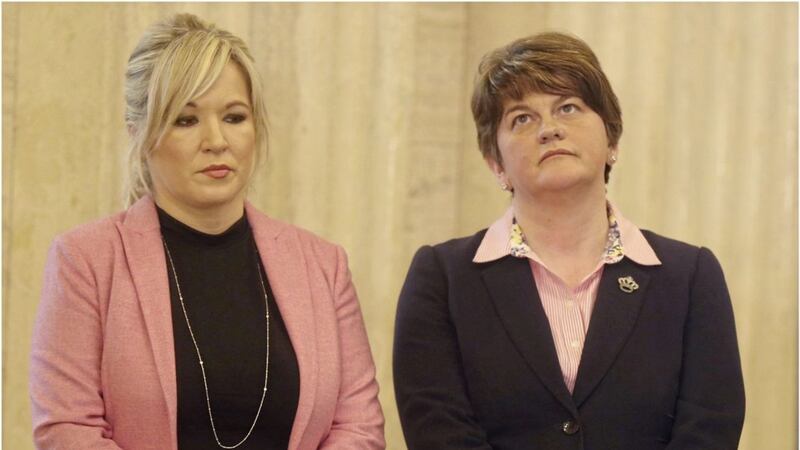The DUP and Sinn Féin have to work with each other. That’s the thumping great reality of politics here. They know they have to work together.
Each of them harried the UUP and SDLP from the late 1980s onwards, before finally eclipsing them at the second assembly election in November 2003. Thereafter they spent the next four years communicating with each other—above and below the radar—and then cut a deal in May 2007 that put both of them at the heart of the executive.
To all intents and purposes theirs is, in fact, a voluntary sharing of power. They sought a mandate to share power and co-govern with each other. They collectively undermined David Trimble and Seamus Mallon in order to replace them as first and deputy first ministers. They negotiated at St Andrews in October 2006 and rejigged the Good Friday Agreement in an effort, supposedly, to make it easier to work together. In other words, they knew precisely what they were doing and where—together—they would end up.
Wouldn’t it make sense, therefore, if they actually found a way of working together; found a way of emphasising and promoting what binds them together in the executive, rather than the sort of serial showdowns which maximize their increasingly obvious differences and personal difficulties? The logic of what they committed themselves to between July 1998 and May 2007 (either one of them, particularly the DUP, could have destroyed the assembly—but they chose not to) suggests that they should, by now—a decade later—have established a very comfortable, civil, consensual relationship.
Here’s the difficulty, though; neither party actually wants to be in government with the other. For both, power sharing represents a fundamental defeat. This is not a process of old enemies coming together in common cause to promote an agreed new future. Rather, it is a process that allows them to remain political/electoral/constitutional enemies, mostly pursuing their own mutually contradictory agendas. And it suits the majority of their voters because they—and we see this manifested in how each party rallies their supporters—want their own party to do little more than keep a foot on the neck of the other.
It’s a difficult cookie to cut in terms of who deserves most blame for the regular crises that cripple progress, yet it’s clear that both believe that the other has reneged on promises and policy pledges. I get accused of playing the “you’re both as bad as each other” card at times like this, yet when I talk to representatives from and voters for each party, they always dump the blame on the doorstep of the other. That’s how they see it: so it shouldn’t be a big surprise that that’s how the rest of us see it, too.
So, is there something that Arlene Foster and Michelle O’Neill can do to address that perception? Let me put that another way: is it their job to try and shift the mindsets of their own voters, or is their job simply to reflect the long-held instincts of those voters? For example, would it make any real difference to unionists if Michelle O’Neill (in terms of rebooting the executive) pulled out as guest speaker at what Sinn Féin has described as the ‘Loughgall Martyrs 30th Anniversary’ parade on Sunday? Will Arlene Foster’s engagement with Irish speaking groups (she even spoke some on Wednesday) encourage republicans to reconsider their opinion of her after the ‘crocodile’ comments?
Probably not, is the answer. The distrust between both parties (and even more so between their respective support bases) is now so deeply ingrained that gestures—even when well intentioned—have no currency. So even if the next series of talks, due to run from around June 12 to 29, deliver an executive, no one will be expecting a change in the personal and psychological relationship between the two parties. Which means, of course, that we’ll still be in ‘battle a day’ territory. “It’s your fault.” “No, it’s yours.” “No, you started it,” “No, it’s …..” Ad nauseam.
Our political process is like one of those optical illusions in which you think you’re making steady progress when all you’re really doing is going round and round and round in circles. We’ve tried, tinkered, fiddled about with and glossed over the process since 1998, yet the most we can say about it is that “it’s better than it used to be.” Really? Hope is gone. Expectation has gone. Confidence has gone. Faith in the institutions has gone. You may as well ask a group of chronic drunks to walk across the Niagara Falls on a tightrope as expect our group of chronic political wafflers to make it to the end of a week without another pointless, self-defeating spat.
Personally, I’d bet on the drunks.








